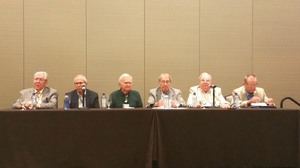>Joe Exum started the lively discussion, joking that "I guess it is an honor to be the oldest person on the panel." Exum shared stories of the very early days of the industry, back when fairs were held in a carnival-like style to promote the latest electric, household gadgets. The fair would travel from town-to-town and the day after it left, women would want to go out and purchase the featured items for their homes. Exum explained that our country was moving from a war time to a boom time, with people using more power for their needs. He said he joined the industry in 1946, starting out making 87 cents an hour. "I didn’t realize it then that I was on the ground floor of a New Electrical Future."
>Don Collette shared that he started out in the industry making 1.28 dollars an hour. He said that TMEPA has always been a highly ethical group, complimenting the first Executive Director of TMEPA, Tommy Walker for his hard word advocating for the industry. "Tommy was a highly ethical person who was very well-respected by all of those in the legislator and at home." It is people who make TMEPA such a great association, the friendships and work that each person does to help the entire industry and the people it serves.
>Bill Moss spoke of more difficult times, when cities were annexing and the cost had to be calculated as well as the moral dilemma of making sure annexation was wanted by the people. He spoke of 1996 Telecommunications Act. "It wasn’t perfect, but it was passed," he said. These connections and decisions are what makes an association like TMEPA needed, he said. "We have to pay attention to customers and relationships with local legislators. It is very important."
>Joe Loggins shared his appreciation for being a part of TMEPA with a story from back when he was just two weeks into a new job. There was a large ice storm, the phones were ringing off the hook, people were blaming the utility board for not trimming enough trees. Then a phone call came from another public utility system offering help. "This was someone out of the clear blue skies calling," Loggins said. "I had never met him, but it really made an impression on me, I imagine every single system here has helped another system." That is why TMEPA is such a vital association, he said.
>Gene Ward started off by saying that he would like to have a conference call with the panel every six months because the call to prepare for the discussion was so much fun. He shared that public records is an important part of what makes a public power system special, as anyone can ask for, and receive, these records. This is not the case with private systems. "That isn’t right," he said about people not having access to records.
>Dalton Smith said he joined the industry in 1956, trying to do as much good as he could. His hard work paid off and he moved up to General Manager after 15 years, serving 38 years in total for the industry. "One of the things that has been important to me," he said, "was if someone had a problem, that problem had to be worked on today."
At the end of the Luncheon, the packed room sang Happy Birthday to Exum, who was turning 89 that day. A series of hugs and conversations continued after the luncheon ended, with friends from many years saying hello and new friendships taking place as well. The community that is TMEPA could be felt just watching these exchanges. The panel discussion from some of our wisest and most-knowledgeable industry members will not soon be forgotten.
 This year’s Luncheon featured some of the brightest minds in our industry, six special people who have been in the industry for many decades. The stories they shared show how our industry has evolved with the times but has also stayed true to its roots of serving the public’s needs. Here are our favorite quotes from our esteemed panel, who provided priceless history, and a few laughs, to a packed room who were lucky to witness this special event.
This year’s Luncheon featured some of the brightest minds in our industry, six special people who have been in the industry for many decades. The stories they shared show how our industry has evolved with the times but has also stayed true to its roots of serving the public’s needs. Here are our favorite quotes from our esteemed panel, who provided priceless history, and a few laughs, to a packed room who were lucky to witness this special event.